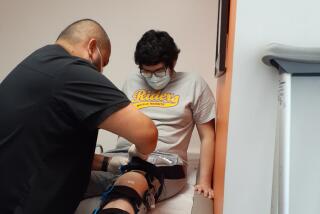City Vote Prolongs Burwell’s Waiting Game
- Share via
Clad in red sneakers, red cap and a red-and-white Cleveland High football jersey, would-be running back Sean Burwell watched from the sidelines last Friday afternoon as Cleveland was buried, 33-0, by Canoga Park. As bench-warmers shouted words of encouragement to players on the field, Burwell walked along the fringe of the mass of players, keeping to himself.
Burwell’s behavior was appropriate, because for the past seven weeks, he has been an exile--football’s version of the man in the iron facemask. Some say he was a victim of, strangely enough, red tape.
After missing two games, wading through an avalanche of City Section paper work and waiting through weeks of meetings, delays, rulings and petitions, Burwell was informed Thursday that he will not play varsity football this season.
At Burwell’s feet lay a game program. Inside, where his name should have been entered alongside the notation for uniform No. 21, was a blank space.
“I’d sure like to be out there,” Burwell said softly as he watched his teammates being blanked. “I just want to play.”
Anybody who follows high school football knows Burwell (6-0, 178) wants to play. Last season as a sophomore at Chaminade, Burwell was fourth among Valley-area running backs with 1,211 yards. Only Crespi’s Russell White (2,339 yards) had more yards among returning players.
The real question was whether Burwell would be allowed to play.
“He had to stand there and watch us lose, 33-0, with tears in his eyes,” Cleveland assistant Art Tillman said. “It isn’t fair.”
Friday’s tears were nothing compared to those that fell after yesterday’s news. The City rules subcommittee unanimously agreed, by a 6-to-0, vote to deny Burwell’s eligibility petition.
What started as a relatively uncomplicated petition for athletic eligibility deteriorated into charges of racial bigotry and institutional bias.
“And Sean is the pawn,” Cleveland Coach Steve Landress said.
Burwell’s odyssey began in August, when he transferred to Cleveland from Chaminade--a private parochial school of 950 students in grades 7-12--after Burwell was involved in an on-campus fight with a teammate. Rather than face punishment, which included a one-game suspension, academic probation and a year of psychological counseling, Burwell transferred.
The transfer was quickly approved, with Chaminade’s blessing. The eligibility request, however, quickly became mired in bureaucratic mud.
Burwell first filed a financial-hardship petition with City officials in late August. CIF rules require a player who transfers without changing his residence to prove hardship in order to be ruled eligible for varsity competition. Burwell, who lives within Cleveland’s attendance boundaries, did not change his address.
On Sept. 24, the City ruled that Burwell’s mother, Sharon, had an income that precluded a financial-hardship ruling. The Burwells changed the plea to emotional hardship on Sept. 28, based on the proposed punishment and alleged racial tension at Chaminade. Burwell was one of a handful of black students attending Chaminade.
The second petition specifically pointed to the fight with lineman Dave Stark, which occurred during an unsupervised weightlifting workout in mid-August. Burwell reported that Stark made a derogatory racial remark that prompted the incident. Chaminade players and coaches have disputed the charge. Stark, who played in his first game of the season last Friday because of a broken jaw incurred during the fight, was suspended for one game.
The season, meanwhile, had started without Burwell. In its opener, Cleveland defeated Chatsworth, 13-6.
The City rules subcommittee was scheduled to make a final determination on the second petition at 7:30 a.m. on Oct. 1. At 7:42 a.m., however, an earthquake forced evacuation of City headquarters and postponement of the vote until Thursday morning.
Today, after weeks of practicing with the team, Burwell is no closer to joining the team.
Burwell left Chaminade amid a cloud of controversy. The scuffle wasn’t the first sign of trouble for the 16-year-old.
“The fight wasn’t his only offense of this type,” said Chaminade Coach Rich Lawson, who is also dean of students. “He’s spent some time in this office.”
A teammate who witnessed the fight claims Burwell hit Stark, who is white, with a sucker punch after Stark brushed Burwell away. Burwell had a history of starting trouble and criticizing other players, said Doug Kavulich, a senior lineman.
“He was just a negative person. Imagine, bagging on the guys who blocked for him,” Kavulich said. “The racism thing really makes me mad. He had friends here. If anything, he was put on a pedestal because he was a running back.”
The pedestal was soon toppled. The four players who were in the weight room at the time of the fight submitted written versions of the incident.
“There’s no mention of racial remarks by any of the four people who were there,” Lawson said. “That’s including Sean’s account. I don’t understand how that fight could be part of any racial charges.”
Burwell said he never pretended to be a model student. The move was best for all parties, he said.
“I was on the list, I knew that,” he said. “But I wasn’t the major troublemaker in the school or anything, not even close.”
Burwell’s version of the fight differs from Chaminade’s.
“Stark was in there working out, and he couldn’t lift this weight, so I kind of laughed at him,” Burwell said. “I was just joking--I’d joked around with him like that before. He got me in a headlock, and it started from there.
“After that it seemed like it all became my fault. I think I got treated like it was all my fault.”
After meeting with Lawson to discuss Burwell’s punishment, Sharon Burwell transferred her son to Cleveland. The punishment, and Sean’s contention that racial tension made attending Chaminade impossible, were cited as the hardship on his second eligibility petition.
“It was more than the fight,” Burwell said. “Other people in the school had called me names. It was time for me to leave. Every year it seemed to get worse. It just seemed like a good time to go, except that it was kind of late in the summer.”
Landress and the Cleveland team were practicing in mid-August when somebody noticed a young man and his mother standing in the distance.
“We asked everybody there if they knew who it was,” Tillman said. “Nobody did.”
It was Sean and Sharon Burwell, who told Landress that Sean had transferred to Cleveland and was awaiting a ruling on varsity eligibility.
“I was pretty jazzed,” Landress said. “He’s a great kid and a great athlete.”
Soon thereafter, it became apparent that the racial issue would slow the eligibility process to a crawl. Landress, whose teams won 3-A City titles in 1983 and ’84 at Manual Arts, an inner-city school, grew impatient.
“I don’t understand it,” Landress said. “A guy gets 1,200 yards at a school, and he’s the star. There must be something very wrong for that kid to want to transfer. If a guy got 1,200 yards for me, I’d be giving him ice cream and cake and making sure he gets to class on time. If he had racial trouble, you get to the bottom of it.”
Landress said he thinks the hardship provision, Rule 214 of the CIF bylaws, is a jumble of ambiguity. The rule states that hardship is anything that causes the imposition of a severe and non-athletic burden on a player.
“For a guy to be forced to undergo psychological counseling is a burden,” Landress said. “For a guy to perceive racial tension is a burden. For a guy to be on probation for a year for something that wasn’t even all his fault is a burden. I can’t believe anybody could read this rule and interpret it to say anything but that. I’m a reading teacher--apparently the rules committee can’t read.
“I think the rule should be changed since it’s only meant to stop coaches at other schools from stealing athletes. That was never even a consideration here. It didn’t happen. He showed up at a practice with his mother. You can’t have a clearer-cut case.”
City administrators agree the case is clear-cut. That’s why the committee was unanimous in its ruling to deny.
“The committee did not perceive hardship,” City Director Hal Harkness said. “It’s that simple. The methodology is subjective, but we have criteria. Sean Burwell didn’t satisfy the criteria.”
Racism, Harkness said, is hard to document.
“It’s very muddy,” he said. “It’s always hard to determine the severity and validity of a claim like this. Racism is the basis of his claim. He said there were behavioral patterns there and numerous undocumented incidents. The committee didn’t feel he proved hardship.”
Harkness, who did not vote, said two of six subcommittee members were black.
Landress questioned whether the City was impartial in light of recent investigations into Cleveland’s swim and basketball teams.
“I think they have a vendetta against Cleveland,” Landress said. “I don’t think the people downtown are going to give anybody a break here. And we don’t want a break, we just want what’s fair.
“Here we have a case where both principals signed a statement asking for unrestricted athletic eligibility. Both schools wanted what was best for Sean. It seemed like the obvious call.”
Don Burwell, Sean’s uncle, will file an appeal today with Dick Browning, an administrator in the City’s senior high schools division. A three-member panel will hear the case. Should that committee deny eligibility, Harkness said, Burwell might demand that the case be heard by Tom Byrnes, the state CIF commissioner.
Sean Burwell said that he might change his home address, which Harkness said could make him eligible. The Burwells own a house and reside in Canoga Park. The Cleveland coaching staff is considering seeking legal injunction.
Burwell is hoping for the best.
“It’s hard to understand how they could say there was no racism,” Burwell said. “Last year there was one other black guy in the sophomore class. There was one other girl, too, but she left. I mean, I felt it. It was there.”
As Burwell finished his sentence, he and Landress walked toward the Cleveland practice field.
“I don’t think I’ll be suiting up today, Coach,” Burwell said.
More to Read
Get our high school sports newsletter
Prep Rally is devoted to the SoCal high school sports experience, bringing you scores, stories and a behind-the-scenes look at what makes prep sports so popular.
You may occasionally receive promotional content from the Los Angeles Times.






